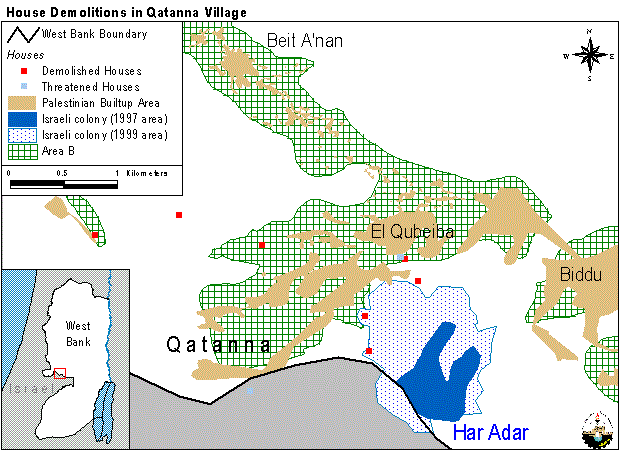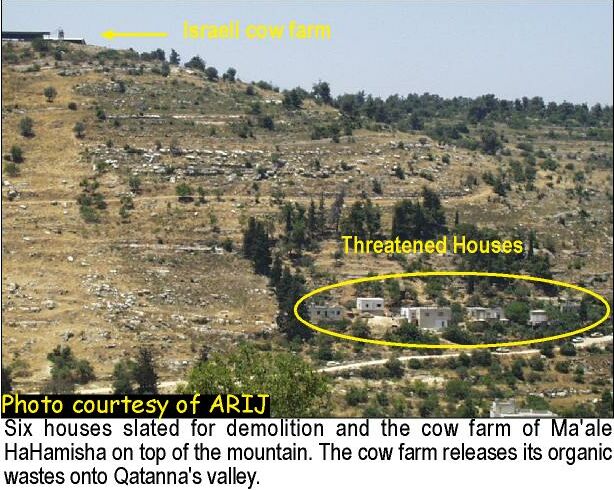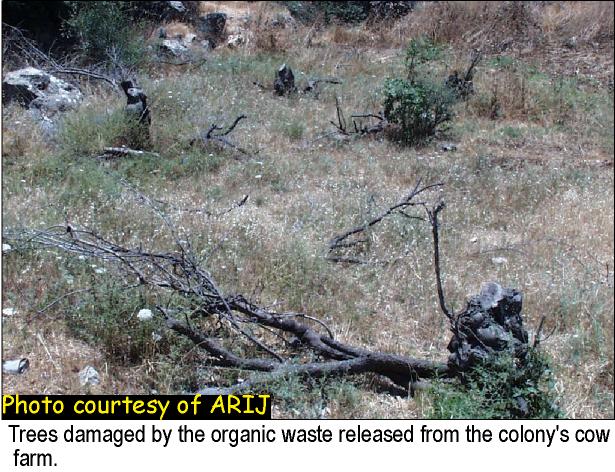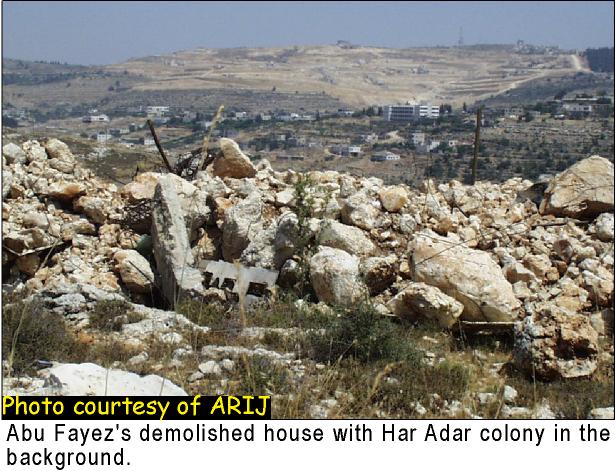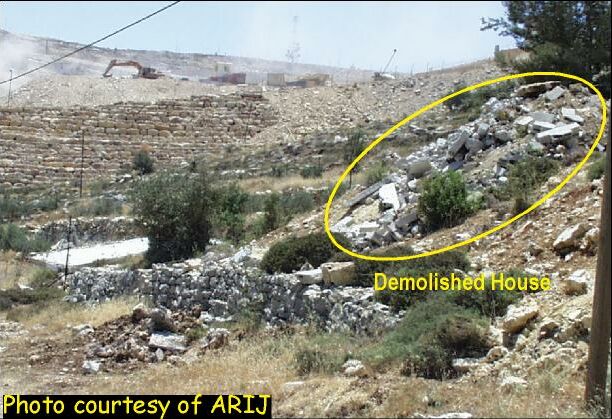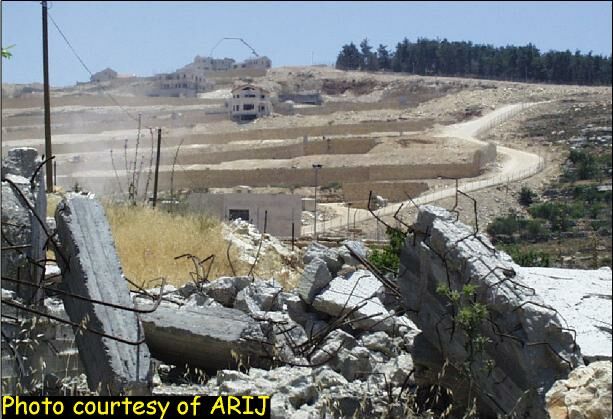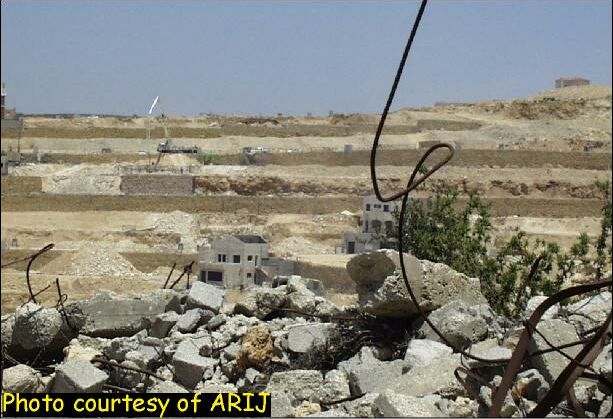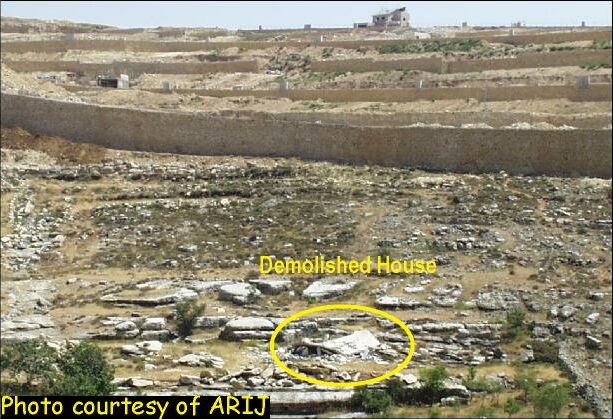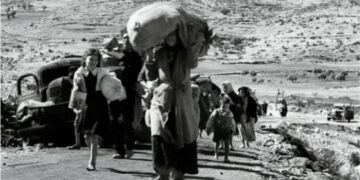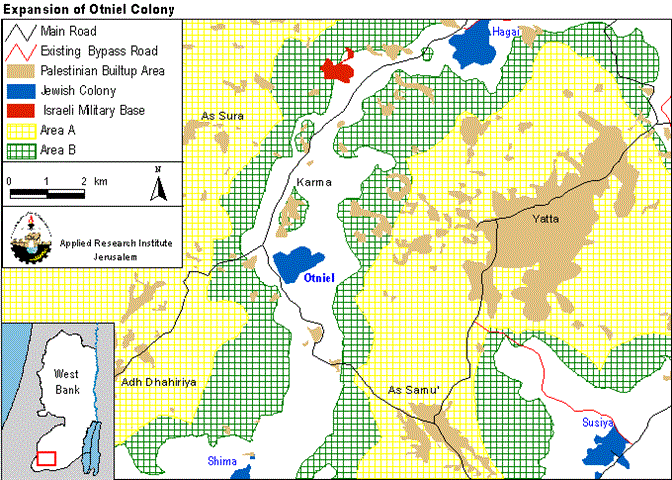The village of Qatanna is a Palestinian village located 12 kilometers northwest of Jerusalem.Currently, its population is around 9000 with additional 7000 who live outside the village. The original area of the village and up to 1948 was 9500 dunums, and after the 1948 war, 5000 dunums came within the No Man's land separating the West Bank from what became know as Israel. Then, with the advent of the Israeli occupation in 1967, further land was confiscated by the Israeli authorities diminishing the remaining lands of Qatanna to half their size (see map).
Click on the houses to see their photos
However, Qatanna's suffering did not stop at the loss of land. During the period between 1948 and 1967 settlers from nearby settlements across the 1949 Armistice Line threatened and harassed the villagers. In 1967, old olive trees were uprooted from Qatanna and replanted near Nabi Samuel. In 1985 there was another such campaign. Organic waste from an Israeli cow farm in Maale Khamisha was released onto Qatanna lands. The wastes have polluted the ground water so that the village council had to build a treatment plant and test the village well periodically (see photos 1 & 2).
Six houses lying next to the cow farm are now threatened with demolition. These houses did not have a proper road until the village council managed to get donations for its construction. However the Israeli authorities stopped the work and destroyed the part that was built (see photo).
Qatanna has been targeted repeatedly by Israelâ??s house demolition policy. Since the 1980â??s scores of houses have been demolished. In 1997, nine houses were demolished within a two-month period (see map).
The latest house demolition was that of Abu Fayez Shamasneh, who built his home on the outskirts of Qatanna in 1995, with the cost of $25,000 coming from his life savings as well as some loans. Before the house was even finished, the Israeli authorities demolished it under the pretext of being built without a permit. Consequently, Abu Fayez had to rent a place in a nearby village where he stayed untill 1999, after which the landlord asked him to leave. So the family had no choice but to rebuild their demolished home once again. In November 1999 the Israeli authorities gave him another demolition ultimatum. But this time, they arrested Abu Fayez, charged him with ''illegal construction'', and brought him to trial in an Israeli military court.
This is the first time that someone gets arrested and charged with ''illegal building''. Human rights activists as well as Abu Fayez's lawyer say that this is a dangerous precedent. If the Israeli authorities manage to get it through the court, then that would give a new thrust to Israel's attempt at curbing Palestinian development. The court ruling has been postponed but the prospects do not seem very encouraging. His house along with the two houses next to him that pertain to his extended family are threatened with demolition. In total, 22 people will find themselves with no shelter if the demolition orders are carried out (see photo).
Meanwhile the settlement of Har Adar (Givat HaRadar), lying right next to Qatanna, is expanding to over three times its size. In 1997 its area was 364 dunums. Today, it is stretching over 1228 dunums. Of course, all that happens at the doorsteps of those very houses that are slated for demolition (see photos 1, 2, 3 & 4). This settlement was established in 1985 on lands confiscated from the villages of Beit Surik, Biddu and Qatanna. Currently it houses 1500 settlers.
Demolished Palestinian houses on the edges of the expanding settlement of Har Adar.
Israel's colonizing activities in the West Bank and Gaza contradict the text and spirit of international law as well as the agreements signed with the Palestinians. Yet Israel continues to create more facts on the ground, to demolish more Palestinian houses, and to disrupt the lives of ordinary Palestinians in more ways than one. The fact that Jewish housing is pursued at such an alarming rate while Palestinians are simply denied this basic right is another indication of how Israel claims to want peace but actually works against it.
Prepared by:
The Applied Research Institute – Jerusalem


